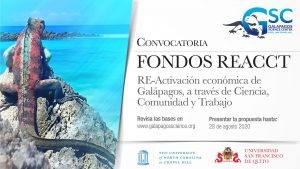 COVID -19 has impacted us all. If we have learned anything through this pandemic, it is that we are stronger together, and above all, community matters.
COVID -19 has impacted us all. If we have learned anything through this pandemic, it is that we are stronger together, and above all, community matters.
During these difficult times, the Galapagos Islands and its communities have been especially impacted through the complete loss of the tourism industry. With nearly 80% of the Galapagos population involved in tourism, the economic impacts are severe and very likely long-lasting.
UNC Center for Galapagos Studies is therefore proud to use much of its recently received donations from GiveUNC to partner with Universidad San Francisco de Quito (USFQ) as well as the Galapagos Science Center (GSC) located in San Cristobal Island, Galapagos to launch a much needed community outreach and engagement program to assist the people and institutions of the Galapagos Islands and at the same time advance studies carried out by UNC and USFQ scientists. This program, known locally as REACCT, is meant to contribute to the reactivation of the Galapagos economy through science, community engagement, and programmatic work activities to further the goals of resource conservation and Island sustainability in the Galapagos Islands. The goal is to support innovative proposals from individuals who have a demonstrated loss of livelihood due to the health crisis and who have developed innovative applied programs to impact the community in highly positive and sustainable ways. REACCT funds will support ventures conducted by residents of San Cristobal Island in four distinct areas:
- Citizen Science – projects that help gather information to better monitor the changes in the Galapagos Islands to benefit science and society.
- Food Security – projects that work to develop or maintain neighborhood gardens or rural crops that improve production and distribution of local, nutritious food from the agricultural highlands.
- Native & Endemic Plant Species – projects that restore degraded environments through nurseries, eradication of invasive species, and cultivation of valued species in the Galapagos.
- Improved Marine Practices – projects to protect marine animals and fishes that enhance conservation and the sustainable use of marine resources.
REACCT was created to benefit the local communities on San Cristobal Island and at the same time enhance our understanding of important topics that UNC & USFQ researchers are studying in the Galapagos Islands of Ecuador. At a time when many researchers are unable to continue their project work in the Galapagos, the local community can enhance local projects that support the interests of the community and the GSC. REACCT is a win-win program!
“The program reaffirms our long-term commitment to the people of the Galapagos and to understanding the complex interactions among the social-terrestrial-marine subsystems that impact island sustainability throughout the Galapagos and in other similarly challenged island ecosystems around the globe,” Steve Walsh, UNC Director of the Center for Galapagos Studies and Co-Director of GSC.
As for the intended impact that we hope REACCT will have in the San Cristobal community, Carlos Mena, USFQ Director of Galapagos Research and Co-Director of GSC says, “Hundreds of families completely lost their livelihoods due to the collapse of tourism in Galapagos. We want to see how families are able to implement new ideas and projects to sustain their families that are consistent with the conservation of the ecosystems of Galapagos.”
Stay tuned for more information about the innovative projects REACCT will be supporting across our four identified thematic areas over the next 6-9 months.
If you are interested in supporting REACCT please reach out to Kelly Weaver (Director of External Affairs & Communications for UNC Center for Galapagos Studies) at weaverk@email.unc.edu. To support UNC’s Galapagos Initiative more broadly please go here.
